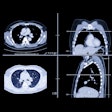
NEW YORK (Reuters Health), Apr 18 - The incidence of prostate cancer is relatively low among men diagnosed with skin cancer, according to a study published in the April 15th issue of the American Journal of Epidemiology, suggesting that ultraviolet radiation may protect against prostate cancer.
"Ultraviolet radiation causes skin cancer, but it has been hypothesized to protect against prostate cancer development and possibly progression," Dr. Esther de Vries, of Erasmus Medical Center in Rotterdam, Netherlands, and colleagues write. "If this hypothesis were true, one would expect skin cancer patients to have a lower prostate cancer incidence than the general population and, more specifically, to have a lower incidence of advanced stage prostate cancer."
To investigate this hypothesis, the researchers followed a population-based cohort of male skin cancer patients diagnosed since 1972 (2,620 squamous cell carcinomas, 9,501 basal cell carcinomas, and 1,420 cutaneous malignant melanomas) for incidence of invasive prostate cancer until January 1, 2005. The team compared the incidence rates of prostate cancer among patients with skin cancer and those in the reference population, resulting in standardized incidence ratios (SIR).
Skin cancer patients had a decreased risk of developing prostate cancer (SIR = 0.89). The lowest standardized incidence ratios occurred shortly after skin cancer diagnosis.
The risk of advanced prostate cancer (stages III and IV) was significantly decreased among skin cancer patients (SIR = 0.73), indicating a possible anti-progression effect of ultraviolet radiation.
"A growing body of evidence, including our findings, support the hypothesis that ultraviolet radiation protects against the development of prostate cancer, possibly through the formation of vitamin D3, although some plasma studies do not clearly suggest a benefit of vitamin D levels on prostate cancer risk," Dr. de Vries and colleagues explain.
If the hypothesis is confirmed, however, "it will be important to modify public health messages regarding ultraviolet radiation exposure," they note. "Levels of ultraviolet radiation that do not result in increased risk of skin cancers should be defined."
Last Updated: 2007-04-17 13:01:10 -0400 (Reuters Health)
Am J Epidemiol 2007;165:966-972.
Related Reading
Treatments for localized prostate cancer differ in side-effect profile, March 30, 2007
Copyright © 2007 Reuters Limited. All rights reserved. Republication or redistribution of Reuters content, including by framing or similar means, is expressly prohibited without the prior written consent of Reuters. Reuters shall not be liable for any errors or delays in the content, or for any actions taken in reliance thereon. Reuters and the Reuters sphere logo are registered trademarks and trademarks of the Reuters group of companies around the world.
















